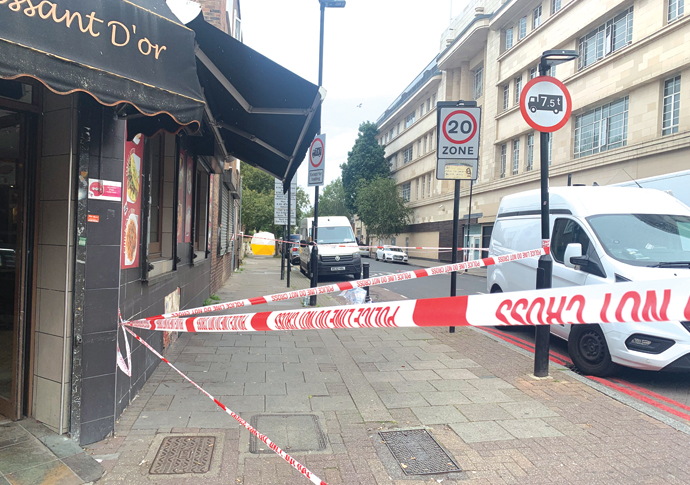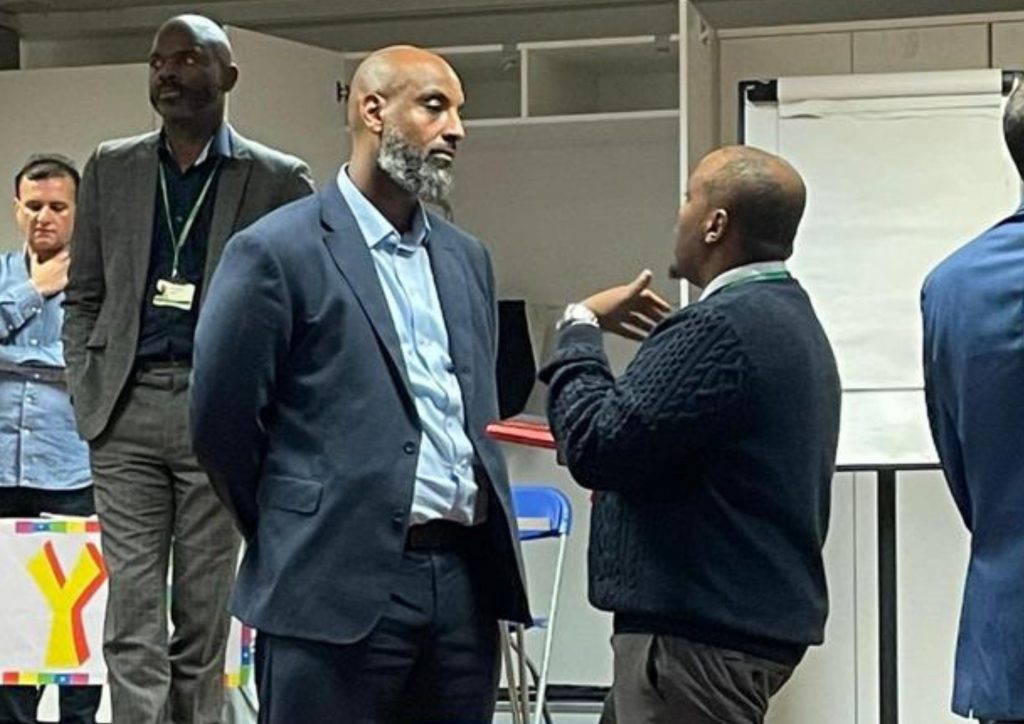Why was stabbed Yayhe left lying uncovered in the street?
Police face anger at public meeting over handling of fatal stabbing
Friday, 6th October 2023 — By Charlotte Chambers

Axminster Road in Holloway, where Yahye was killed
AN urgent police review has been launched after the body of a young man was left uncovered on the street for more than four hours after he was stabbed to death.
More than 100 people attended a meeting on Tuesday after details spread through Islington’s Somali community that the body of Yahye Ahmed, 23, had been left on view by police guarding the crime scene in Holloway on August 30.
Councillor Bashir Ibrahim said he organised the meeting, held at the Andover estate community meeting hall in Finsbury Park, to address a wide range of issues facing the community that had left them feeling “concern and fear, as well as anger”.
Calling the treatment of Mr Ahmed’s body “concerning,” he said: “The main reason I called this public meeting is because I think there’s been a general unease in the community. And not just from, unfortunately, the murder of Yahye Ahmed, but I think it’s that wider piece around the community feeling like they are over-policed, under-protected and often neglected.”
He said the community felt the way Mr Ahmed’s body had been treated fed into a general feeling that a number of “intersecting discriminations” had led police to an “institutional failure” to “protect and safeguard us”.
“I’ve heard time and again from the community and from direct eyewitnesses who said they saw Yahye’s body lying on the ground for hours after the murder took place. It was visible,” the councillor said.
“The meeting was a chance for the community to say ‘How could that happen?’ and that’s what I as chair had to slightly underscore that point and say to them ‘you have to understand how much this is going through the community’ – that lack of dignity in death.”
Mr Ahmed’s mother was at the meeting, as was Islington North MP Jeremy Corbyn MP and the community safety chief for Islington Council, Councillor John Woolf.
Superintendent Jack May-Robinson, who leads the borough’s safer neighbourhood teams, was also present, and pledged to report back on the investigation within two weeks.
The meeting heard from speakers who said if they tried to engage with police, they felt disregarded because of their accents or fluency in English, while others complained that they felt their sons were repeatedly targeted in stop and search campaigns.

Besserat Atsebaha, Islington’s Director of Community Safety, left, with Councillor Bashir Ibrahim at Tuesday’s meeting
Cllr Ibrahim said the main result of the evening was to have a Somali-led community hub where people can gain access to education and jobs but also policing support.
He also highlighted the murder of Kamal Nuur, an 18-year-old who was fatally stabbed in 2020, and how he felt a dearth of youth services have left young people at the mercy of gangs.
“What they’re saying is actually how can you work with us and how can you guys keep us safe?” said Cllr Ibrahim.
“They feel like the interaction that they have with the police is through quite a negative lens.”
The community outcry came just days after Cllr Woolf stood up in a full council meeting at the Town Hall last Thursday to outline a ten point action plan politicians have drawn up, alongside police, to hold them to account.
He also urged Islington’s top officers to accept the label of “institutional racism” within the force – as described by Baroness Casey in her watershed report in March – arguing that without doing so they will fail to regain the community’s trust and restore policing by consent.
Superintendent May-Robinson said: “In general, when a murder investigation is launched police are not in a position to remove a body from a scene immediately, due to the crucial forensic work that must be undertaken. In this instance, two tents were sent to the scene, but were not suitable due to damage. A third tent took some time to arrive.
“In the interim Mr Ahmed’s body was covered with a sheet, and officers on scene extended the cordon to create distance between Mr Ahmed and members of the public. Due to the public setting some people may have seen his body in situ.”
He added: “I have written to our local Councillor to explain what happened, and to apologise for the impact this has had on the community, and indeed Mr Ahmed’s family. I have also offered to meet them personally to apologise. Officers in Central North have been informed so we can ensure we are in a better position moving forward. The meeting was a valuable opportunity to listen to concerns from the Somali community in Islington around safety, engagement with police and trust and confidence within the Met.
“Islington Police are working in partnership with the local authority and our communities to deliver the New Met for London strategy to achieve More Trust, Less Crime and High Standards.”
Elkadmiri, 30, has been charged with murder and possession of an offensive weapon. Ahmed Abdi Ahmed, 33, has been charged with assisting an offender.
Safety chief challenges Met
ISLINGTON’S community chief has called on high-ranking police officers to accept the term “institutionally racist” about the Met.
Labour councillor John Woolf, who has been executive member for community safety for 18 months, said they should follow the label used by Baroness Louse Casey in her report into how London’s police force was operating.
She was brought in to investigate after a series of scandals and crimes linked to officers. “I don’t think this is mere semantics,” said Cllr Woolf at last Thursday’s full council meeting.
“I think it’s really important they accept the recommendations in full, firstly, because it comes from an independent and highly respected public servant who was given full access to the meta data and people. If they can’t accept the findings in full, it’s hard to move on. I think it’s important in terms of recognising the lived experience of many Londoners.”
Baroness Casey’s report said: “The Met has yet to free itself of institutional racism. Public consent is broken.”
Multiple examples of misogyny, racism and homophobia in the force were identified.
Cllr Woolf described how he was “very concerned” that young people from minoritised communities said they felt “targeted” by police and warned without trust, policing by consent is “ineffective”.
He added: “It’s really serious. It’s really important that they restore that trust and confidence,” he added. Met Commissioner Sir Mark Rowley has been criticised by both the mayor of London Sadiq Khan and Baroness Casey about his refusal to accept the label “institutionally racist”.
Met press officials declined to comment further on Cllr Woolf’s requests.
In June, borough commander Chief Superintendent Andy Carter said the police wanted to demonstrate it was anti-racist but said he supported the commissioner, adding: “I can’t, hands on heart, say yes I agree with it [the label of institutional racism] when there are many different connotations around that.”